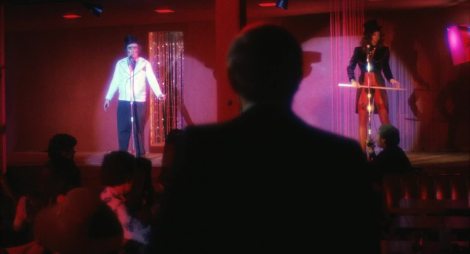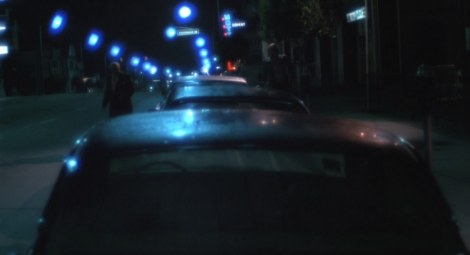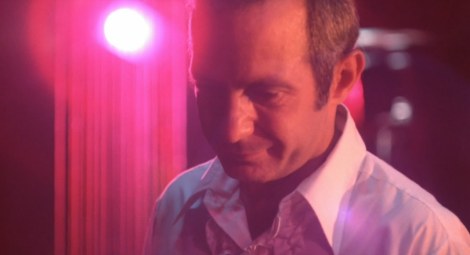 [9.5]
[9.5]
Written & Directed by John Cassavetes
Faces Distribution
Rated R, 108 min.
Many directors have made films that use strip clubs as a pivotal location, but few have successfully rendered pictures in which audiences can practically feel the bitter sting of smoke in their lungs, taste the oaky kick of cheap whiskey on their tongues, and absorb the sheer, desperate loneliness of it all, and allow it to flood through them as if it were their own.
This was the sensation wrought by my first viewing of John Cassavetes’ The King of a Chinese Bookie yesterday morning, when I saw a 35mm “brunch screening” at Brooklyn’s Nitehawk Cinema. My experience was further permeated by the aroma of eggy foods, the occasional clinking of utensils, a hushed request for coffee with milk, and a young lady who felt the need to take Instagram pictures of Ben Gazzara’s close-ups. It was an environment of both subtle details and predictable audience quirks, and seemed eerily fitting to house the film’s sleazy of environment of SoCal in the mid-70s; one we’ve seen in countless movies since, but rarely as captivating and baroque than in front of Cassavetes’ lens.
Gazzara plays Cosmo Vittelli, owner of this flick’s strip club, and the central character who utters this passage of dialogue:
“I’ve got a golden life. Got the world by the balls. That’s right, I’m great… I am amazing.”
Things turn not so amazing for Vittelli rather quickly, as his recently paid-off gambling debt reverses itself during a night of losing $23,000 in a poker game. The suited crooks he owes tell him to murder a Chinese bookie in exchange for reducing his debt, and hence begins a tale of cold deceit and double-crossings, murder and sheer depression. Meanwhile, Vittelli shares an affectionately bumpy camaraderie with his slew of dancers, one of whom he loves, and his utterly strange club singer, Mr. Sophistication.

Cassavetes’ aesthetic utilizes rough edges to their maximum potential – as a mechanism for dropping us within the environment of his characters, and assuring that we feel the grit, spontaneity, and strange rhythms of their lives, where even moments familiar to the characters contain unique and perceptive details, and the threat of violence lingers in the backdrop. The film even makes use of extended sequences of the club’s bizarre, almost surrealistic song and dance routines, which serve as a vaudevillian source of comfort to ease the hopeless mess and squandered life that Vittelli has fallen into.
Through random quick cuts to disorienting shots, seemingly unmotivated focus pulls to beautifully composed one-point perspective, Cassavetes finds a pace and atmosphere that is unique to his characters’ lives; sometimes frustratingly inert, and at others, chaotic and obscure. As Vittelli can’t often see the pieces of his life’s puzzle, neither can we fully distance ourselves from what we’re seeing onscreen and put those pieces together. We’re in the thick of it, alternating between fascination, suspense, boredom, fear, despair, humor, and at the sight of streetlights that look as they do in life, but take on a glow of otherworldliness when translated to film, sheer awe. It’s a beautiful contradiction.

There’s a shot where a sitting woman is composed between two men, each on either side of the frame with only their hands in close-up. As they discuss a situation that involves her, her inherent helplessness in the moment is accentuated not only by their words, but by their overtly masculine gesturing. Cassavetes knew how to pull off moments like that, how to draw attention to strange particulars that are remarkably telling.
Naturalistic, documentary-like shots often only capture part of a character’s body, sometimes with their faces out of frame. These scattershot pieces form something of a crime masterpiece, one that should be as revered as its many influences, including Goodfellas, pretty much every Michael Mann movie or post-’76 L.A. noir, and the stylistic vehicle (pun intended) of Nicholas Winding Refn’s Drive.
In an absolutely show-stopping monologue toward the end of the film, Gazzara executes the climax of his pitch-perfect performance, claiming:
“You gotta work hard to be comfortable. Yeah, a lot of people kid themselves, you know. They-they know when they were born, they know where they’re goin’… they know whether they’re gonna go to heaven,whether they’re gonna go to hell. They think they know that. They kid themselves. Right? But the only people… who are, you know, happy… are the people who are comfortable.”
Gambling, excessive alcohol, drugs, strip clubs… these are things that give us the illusion of comfort, the fantasy that life can be continuously pleasurable, and that we can somehow defeat the randomness, absurdity, and difficulties of life by taking a massive dose of pseudo-confidence, by pretending that we’re in control and having a great time. But that’s not happiness. If happiness lies in comfort, it also lies in accepting life for all it is, including some things that are seriously messed up.

Cassavetes knew that, which is why he made a film about vice, heartless criminals, and someone who might be happy if he could only escape them. But when his actions and self-pity lead him down a violent rabbit hole, putting on a face of fake comfort is really Vittelli’s only option. The brilliantly uncomfortable Killing of a Chinese Bookie is both a character study and genre piece about being in discomfort, and the seemingly impossible task of escaping it, especially when surrounded by deceivers, killers, and personal temptations. We all fall into our own traps.
Vittelli’s existence has become sporadic, but largely as a result of his recurring acts of self-destruction, driven by engrained weaknesses. But his club performances continue, even as Vittelli himself faces an uncertain fate. The show goes on, as does life, under dim lights, familiar smells, and with strangers who we pretend are friends, if only for the night. But if all your nights are the same, how long will it be, really, before the pattern is broken from the outside? Especially if your actions, like many do, inversely affect the outside?
A theater employee eventually asked the young lady who was Instagramming to put her phone away. After a few disheveled looks to the guy beside her, she eventually locked her eyes onscreen. She transformed her choice. It may have mattered to her, but it didn’t matter to Cassavetes. As the film continued, it was clearly indifferent to her decision. The show goes on.
